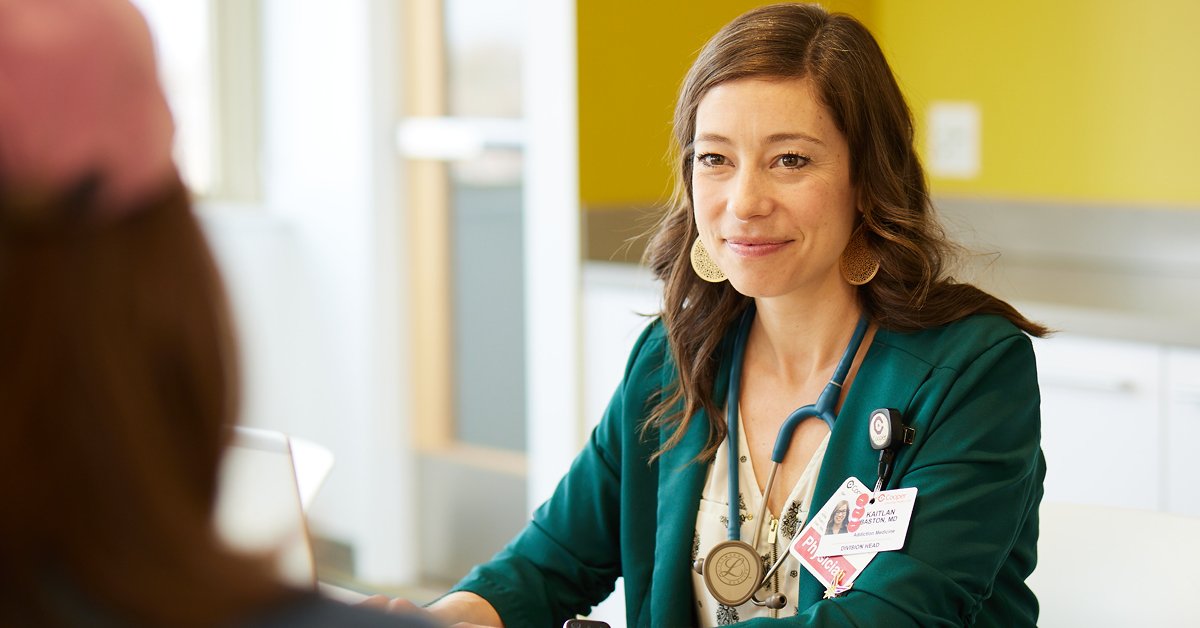CMSRU lands $1.3 million grant to provide free opioid-addiction treatment
CMSRU lands $1.3 million grant to provide free opioid-addiction treatment

Effective treatment is available for opioid addiction—but for many area residents, the cost is out of reach.
Now, a major federal grant will enable physician faculty from Cooper Medical School of Rowan University (CMSRU) to provide this life-saving treatment to those who couldn’t otherwise afford it.
The $1.3 million award to CMSRU will fund free treatment for at least 185 patients without health insurance at Cooper Health’s Center for Healing in Camden, Blackwood, and Pennsville. The program centers on the use of proven medications, as well as other supports, to treat opioid addiction.
“This grant will enable us to help people who wouldn’t normally have access to this level of care,” said Kaitlan Baston, MD, assistant professor of medicine at CMSRU and head of addiction medicine at Cooper University Health Care. “It will reduce disparities and promote health equity in our community. I’m really excited about that!”
People who will benefit include those with few financial resources and who face a range of social challenges. They are often immigrants, undocumented, or homeless, and may have other disabilities or health issues. They may not qualify for government health insurance such as Medicaid or Medicare, or they may need help applying for such programs.
The initiative will address a critical need In New Jersey, where an estimated 38,000 people were unable to obtain treatment for substance use disorders in 2019 alone.
A Full Range of Supports
Treatment for opioid addiction—known medically as “opioid use disorder” or OUD—is often unaffordable for the uninsured, with costs ranging from $500 to $700 or more a month. That includes medical appointments, medication to treat the OUD, and related supports such as mental-health treatment, smoking-cessation (nicotine) patches or gum, and bus fare to get to the clinic.
The grant will cover all of these expenses for people without insurance who qualify based on income level. It will also enable the program to provide patients with group education sessions, connections to housing assistance, vocational and social services, and even food and clothing.
This care is life-changing, says Dr. Baston—enabling people to live longer, healthier, more satisfying lives.
For example, patients receiving such medication treatment reduce their risk of an overdose by an average of 76% at three months, according to a 2018 study. This approach also helps people remain in treatment, increases their ability to gain and maintain employment, and enables pregnant patients to have healthier babies, according to the Substance Abuse and Mental Health Services Administration, which provided the grant funding.
“The longer people stay in treatment, the better their outcomes,” adds Dr. Baston. “People can feel a lot of fear and stigma with this condition, so we make sure everyone is treated with compassion and care.”
In fact, OUD treatment must usually continue for the rest of a person’s life—similar to care for other chronic diseases like diabetes or high blood pressure.
“People are at high risk of overdose if they go off their OUD medication, even after a year or two,” the physician says.
Seal of Approval
The grant is a key endorsement by the N.J. Department of Human Services, which chose CMSRU as one of the state’s two recipients of the federally funded award—called the State Opioid Response Medication Services Grant.
“We’re thrilled and honored to receive this important recognition of the quality of our OUD treatment program,” says Annette C. Reboli, MD, dean of CMSRU. “The grant will enable us to fill a huge unmet need, improving the lives of so many people who are often overlooked in our society.”
The addiction treatment program is a state-designated Center for Excellence in medication for addiction treatment, and “probably the most robust” such center statewide, says Dr. Baston.
“As an academic medical center, we can take the most complex cases,” she explains.
The Center for Healing also provides hands-on training for CMSRU students. The future doctors spend a week-long rotation at the facility during their third year, and fourth-year students can take an elective there. Students study addiction medicine all four years at CMSRU, as part of the overall curriculum.
Looking Ahead
The grant covers a 15-month period through September 2022. After that, Dr. Baston hopes the funding will renew annually. In the meantime, she and her staff will collect data on patient outcomes and gather patients’ feedback to learn how to continue improving the program.
“We’re looking to advance the field of addiction medicine and demonstrate the necessity of this care,” says Dr. Baston, “so it can be expanded even further to help more people.”
To Access the Program
Prospective patients can learn more, including whether they qualify for free treatment, by calling or visiting the Center for Healing:
- Walk-in visits are available 1 to 4 p.m., Monday through Friday, at the program’s offices at Cooper University Hospital’s Sheridan Pavilion, 3 Cooper Plaza, Second Floor, Suite 220, Camden.
- To make an appointment, call (856) 342-3040, and schedule a visit in Camden (two locations), Blackwood, or Pennsville.
To qualify for free services, a patient’s income must be no greater than 350% of the Federal Poverty Level.